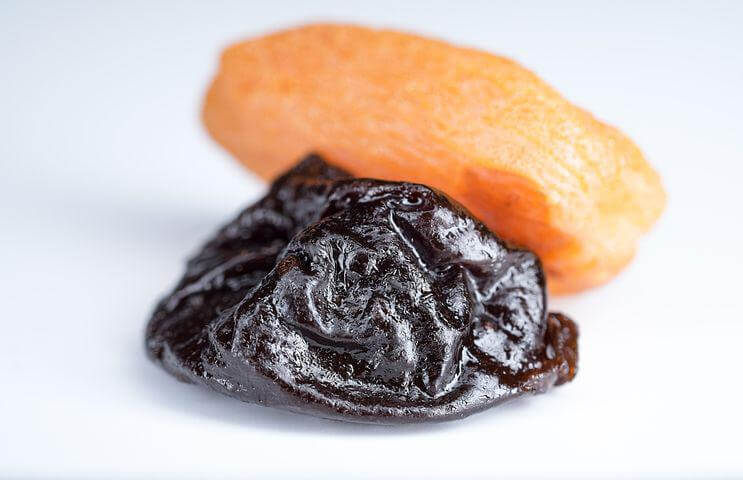A study recently published in the American Journal of Clinical Nutrition revealed that daily prune consumption preserved bone mineral density (BMD) at the hip and protected against increased fracture risk in postmenopausal women.
Researchers from Pennsylvania State University conducted a 12-month randomized controlled trial to test the effects of daily consumption of 50 grams (5-6 prunes) and 100 grams (10-12 prunes) of prunes on BMD in over 200 postmenopausal women. Results indicated that women who consumed 50 grams of prunes a day for one year maintained hip BMD while those in the control group who ate no prunes lost significant bone mass at the hip. Further, hip fracture risk increased in the control group while those who consumed both 50 grams and 100 grams of prunes experienced no increase in hip fracture risk.1
“Our data supports the use of prunes to protect the hip from bone loss post menopause. Indeed, these data may be especially valuable for postmenopausal women who cannot take pharmacological therapy to combat bone loss and need an alternative strategy”, said Principal Investigator Mary Jane De Souza, PhD, FACSM, Distinguished Professor, Pennsylvania State University.
After menopause, women tend to lose bone density rapidly and they are more likely to have osteoporosis than men.2 Women also experience three-quarters of all hip fractures typically from falling, and women fall more often than men3. Hip fractures are difficult to recover from and can lead to decreased quality of life, financial stress, and increased risk of early mortality.4 This new research demonstrates a favorable effect of prune consumption on BMD at the hip and suggests that prunes may serve as a food-based option to support bone health in aging women.
Previous clinical trials in postmenopausal women have shown the promising effects that daily prune consumption can have on preventing bone loss.4 This new study represents a milestone in prune research as it is the largest clinical trial to date with a sample size of 235 postmenopausal women.
“While this latest research showed a significant benefit for postmenopausal women, prunes can make a significant nutritional contribution to any eating plan at any stage of life”, according to Andrea N. Giancoli, MPH, RD, Nutrition Advisor, California Prune Board. “Prunes are a delicious and convenient snack as travel picks back up and everyone is getting back into routines. Plus, this whole fruit is surprisingly versatile as an ingredient in both sweet and savory recipes.”
To learn more about the nutritional benefits of prunes and how they fit into a variety of recipes, visit CaliforniaPrunes.org.
ABOUT THE CALIFORNIA PRUNE BOARD
The California Prune Board was established in 1952 to represent growers and handlers under the authority of the California Secretary of Food and Agriculture. California is the world’s largest producer of prunes with orchards across 14 counties in the Sacramento and San Joaquin valleys. Promoting a lifetime of wellness through the enjoyment of California Prunes, the organization leads the premium prune category with generations of craftsmanship supported by California’s leading food safety and sustainability standards. California Prunes. Prunes. For life.
- De Souza MJ, Strock N, Williams NI, Lee H, Koltun KJ, Rogers C, Ferruzzi MG, Nakatsu CH, & Weaver C. (2022). Prunes preserve hip bone mineral density in a 12-month randomized controlled trial in postmenopausal women: the Prune Study. The American Journal of Clinical Nutrition, nqac189, https://doi.org/10.1093/ajcn/nqac189
- Centers for Disease Control and Prevention (2022). Does Osteoporosis Run in Your Family? Genomics & Precision Health Topics. https://www.cdc.gov/genomics/disease/osteoporosis.htm?CDC_AA_refVal=https%3A%2F%2Fwww.cdc.gov%2Ffeatures%2Fosteoporosis%2Findex.html
- Centers for Disease Control and Prevention (2016). Hip Fractures Among Older Adults. Older Adult Fall Prevention. https://www.cdc.gov/falls/hip-fractures.html
- Brauer CA, Coca-Perraillon M, Cutler DM, Rosen AB. (2009). Incidence and mortality of hip fractures in the United States. Journal of the American Medical Association. 302(14):1573-9. doi: 10.1001/jama.2009.1462. PMID: 19826027; PMCID: PMC4410861.
- Damani JJ, De Souza MJ, VanEvery HL, Strock NCA, & Rogers CJ. (2022). The role of prunes in modulating inflammatory pathways to improve bone health in postmenopausal women. Advances in Nutrition, nmab162, https://doi.org/10.1093/advances/nmab162


